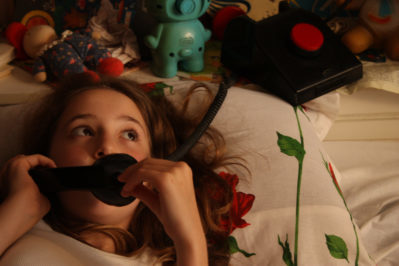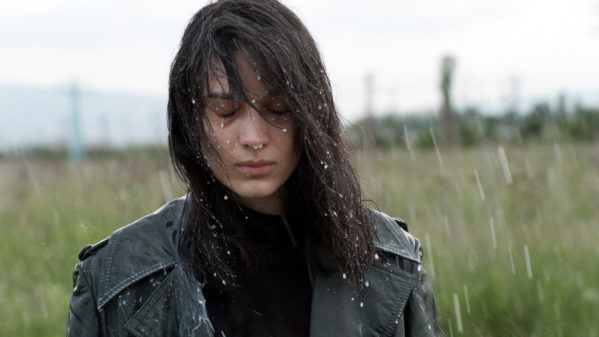INTERVIEW: ‘Viktoria’ follows three generations of women in final years of People’s Republic of Bulgaria

Viktoria, the new film from director Maya Vitkova, delves into the crucial final years of the People’s Republic of Bulgaria. As the country transitions to democracy, three generations of women are depicted as they struggle in an uncertain time.
The title character (played by Daria Vitkova and Kalina Vitkova at different ages) has a unique relationship with her mother, Boryana (Irmena Chichikova). From the time of Viktoria’s birth, nothing is by the book. First off, the young girl is born without an umbilical cord, and Boryana is resistant to having a relationship with her daughter. However, when Viktoria is named the country’s “Baby of the Decade,” the spotlight is put on this young girl living in a time of historical importance.
This is Vitkova’s first feature as director, and she recently exchanged emails with Hollywood Soapbox about the film and its important lessons. Questions and answers have been slightly edited for style.
The film, from Big World Pictures, is currently playing at the Laemmle Royal on Santa Monica Boulevard in Los Angeles. Vitkova will take part in question-and-answer sessions after 8 p.m. screenings though June 15.
What was your impetus for making Viktoria?
The formal [impetus] was making another professional step in my life. I wrote Viktoria when I was 27 (it took me nine years to make it), and I was working as an AD and casting director for almost 10 years before that. If I wanted to make my own films, it was about time to start … But the real reason was subconscious — this story was inside of me and wanted to get it out.
What came first the idea for the story or the central characters?
If I am to talk about the beginning, of a first image that I recall, it was a birth I depicted shortly before writing the first treatment of Viktoria. I used to write short stories for years, participating in literature competitions at the beginning, then after being always on the second or third place (always coming in after friends and relatives of the jury), I only wrote for myself. So I depicted a comedy birth in one of my short stories, involving the main character, a girl. When she was born, the wave of her mother’s waters was so big that it threw her out of the hospital, straight into her father’s arms. … It was only possible, because she was born without an umbilical cord to connect her to her mother.
How much of the film is based on your own memories of this time in Bulgaria?
The entire film is based on my memories combined with my fantasy. You live your life, and you have this great tool when going through hardship or beautiful times. Since you are dealing with art, you store everything inside of you, keeping it somehow at a distance from you, not fully going through it, protecting yourself (especially when in pain). And then one day you realize that it happened for a reason, not only to make you who you are but also to help you do your films (in my case). There are little details I recall from when I was 10 that found their place in Viktoria. It’s amazing. But then again, going back to reality — I had a great childhood. I had many friends (or guys I was bullying around) while my family was falling apart. … Writing that suddenly made me feel sad, although I meant to do a joke. The same goes with the film.

What were some of the challenges of the shooting process?
The first big challenge is being a female producer in Bulgaria. Nearly everyone I was doing business with — rental, catering companies, etc., wanted to cheat me. Thanks to having a great lawyer and being very well prepared with contracts (I used to read the contracts like reading Ulysses by James Joyce, minding every single little detail), I survived.
As a director, I would say everything was pure fun; everything that didn’t work was for the best. In the script I had included a white river, a river made of milk that one of the characters falls into. But we couldn’t find a good technical solution to making it; it could have looked very bad in the end. … Here’s how one of my favorite scenes in the film came to life. I won’t spoil it for you now. Making films in Bulgaria is like living in a horror film; you don’t know where the danger comes from, and then it gets all bloody. But I had a great, dedicated crew and a very supportive family, so I made it.
Although personal and specific to Bulgaria, do you believe there are universal themes in the film?
My experience traveling with the film (it went to more than 70 festivals worldwide) shows it is universal. We were all born by mothers, and we are who were are because of the love they gave us or deprived us from. Show me something more universal than parent-children relationship (smile).
The critics have commented on your command of a definitive visual style. This being your debut feature, how did you achieve the “look,” or visual style, of the film?
I’ve been reading classical literature since I was 10 years old. I read War and Peace and Anna Karenina when I was 11. Dostoevsky and all the big guys … That was building up on the side of a good taste and archetypes in the literature. My mother and my father were crazy about cinema, so I was seeing films since I was 1 year old, not exaggerating. That one was on the side of having cinema run in my blood and loving it madly.
I decided to become a director when I was 12, after seeing Wild at Heart by David Lynch. I could say that cinema saved my life when I was a teenager. I didn’t smoke, drink, take drugs, [and] being the addictive person I am, it surely saved me. I was watching films. And you form a taste that you stick to, subconsciously, when working. And you refuse to let go, no matter the surroundings. And of course working with the right people. I believe my cinematographer, Krum Rodriguez, is one of the most talented guys in the industry, not only in Bulgaria, the art designer Rin Yamamura as well. So no wonder what they say about the visual style of Viktoria.
Do you believe western audiences need to see more artistic work from eastern Europe? Would that help in understanding global issues and lessons of 20th-century history?
I believe western audiences should see more good artistic work from eastern Europe. For one or two hours, it will take you on a trip you didn’t believe existed. And you will have something to think about. … The same goes for all audiences. We should look at artistic work from around the globe to understand the world we live in and we’re trying so hard to destroy. It’s a beautiful planet, with so many wonders, a place to fall in love with — we should give ourselves a chance.
By John Soltes / Publisher / John@HollywoodSoapbox.com
Viktoria is currently playing in Los Angeles. Click here for more information.

